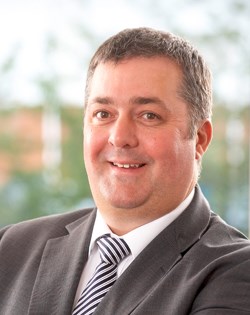Planning and having a sensible idea of what the competition may be is all well and good, but how does Spencer hope to implement this?
“Different customers have different requirements. We need to design something that will take certain costs out. If a train is late it is not just one box, but for a lorry it is. Reliability is important.”
He continues by ramming home his viewpoint: “Quality, quality, quality is the key issue. We are nothing without customers.”
Freight Performance Measure is discussed. This is designed to measure how freight trains are operating, in a similar way that Public Performance Measure does for passenger trains.
“The drive for performance reliability is not driven by FPM, it is about service to customers,” says Spencer.
However, he speaks highly of what Network Rail is trying to do.
“Paul McMahon is great. We started at the same time - he wants a collaborative nature. There is an open relationship. There are things we need
to do as an industry.”
Spencer suggests expense may be an issue: “It is capacity on some routes. Electrification will help. And when HS2 comes, it will free up paths.
“It is nice to see Network Rail planning. Do you know what the average speed of our freight trains is? 22mph. If we can get better paths that improves.” He says that the Midland Main Line already suffers from capacity constraints.
Spencer notes that people seem to be more open-minded towards freight these days, and that “it feels good” that McMahon is speaking to the industry.
“Our biggest tonnage is coal. There is significant aggregates growth, and we have recently invested in Bow East Terminal for that. We are about to order some new wagons and have moved HTA wagons to aggregate flows, too. There is a huge draw for aggregates in London.”
Aggregates is a big market for DB Schenker, he says. “We saw that this is a market we
want to be in, that is growing. We want to be there for a period of time. If we enter a market then it needs to last.”
Spencer says that the deal with Mendip Rail, where huge stone trains run to and from quarries in the Mendips, has witnessed increased tonnage: “We plan 92 trains per week and that has risen to 130. We have invested a lot for that deal, and are working with customers to improve it.”
He also believes that automotive is a big market. “It is a big deal. There is significant investment there. We are getting into the European market, and there are a lot of parts transported.
“I think that it is a changing market. Most things can and will travel by intermodal.”
But if the markets are growing, does the fleet need to grow?
When first privatised, EWS was quick to buy 250 Class 66s and thousands of wagons, and followed this up with an order for 30 Class 67s. But since then it has not placed any orders, while DB’s competitors have bought Class 66s, ‘68s’, ‘70s’ and ‘88s’. Rebuilt Class 73s are being introduced, while GB Railfreight sees a market for Class 92s.
Meanwhile, EWS (and later DB) has been sending locomotives abroad, or selling them. So, almost 17 years after the first Class 66 arrived, is there a market for a new fleet?
“We have no plan to buy locomotives. Class 66s are becoming more reliable. We use condition-based maintenance, and are now more proactive when it comes to their failures.”
DB’s Class 60s also have a future (RAIL 767). “They are a strategic effort. They have not been heavily used before,” he says.
The operator also has the ability to “switch the fleet”, he says. “We have Class 66s in France and Poland, and ‘92s’ abroad. We can call them back if we have to. The ‘66s’ in France can come straight back. Locomotives in Europe can move around.
“We have capacity. The Class 92s are at a startup operation that couldn’t afford new traction. The only reason locomotives are not imported to the UK is because I cannot bring European gauge locomotives into this country.”
Capacity and performance is key to what DB does. Says Spencer: “It is different relationships with customers. We will not put our foot through the door, and we will not trade off price for quality. We aim to deliver our promises, and if we cannot do it we will say.”
DB has taken on 280 staff in the past year. “We are underpinning the business,” says Spencer, adding that the figure includes former staff who have returned to the DB fold.
“We wanted them back, and they wanted to come back. We are creating a culture here. We create leadership… we give a framework. I want people to be empowered. It is about a culture change… a culture change that we are driving through. As a senior team we have developed values, and we succeed as a team.”
Spencer set about implementing this strategy when he returned to the UK: “My view is setting standards and manage them. Give them the capability to be able to do their job.”
He says DB has examined how it recruited staff previously. “We had problems with drivers, so we spoke to the unions, to ASLEF, and did a three-year deal with it. We have a good working relationship with the union. We continue to work with them.”
Driving schools have been introduced at Toton, he explains. “We are recruiting off the street. I want to talk to them in the first week.”
Safety is also a key driver. “It is vital. We did a review and asked what the issues are. It is about that focus. I like the ‘Switch on to Safety’ mantra.”
He says that when DB was investigating safety issues, it found that one of the biggest problems was people falling down stairs, so now staff must hold on to the stair rails. It may seem a little thing, and perhaps irritating for visitors when it is implemented, but it is working. “We want that across the business.”
Spencer also wants to introduce a ‘performance for quality’, which entails the introduction of performance manager centres. Meetings take place at 1500 on a Monday, and take one hour.















Comment as guest
Comments
No comments have been made yet.